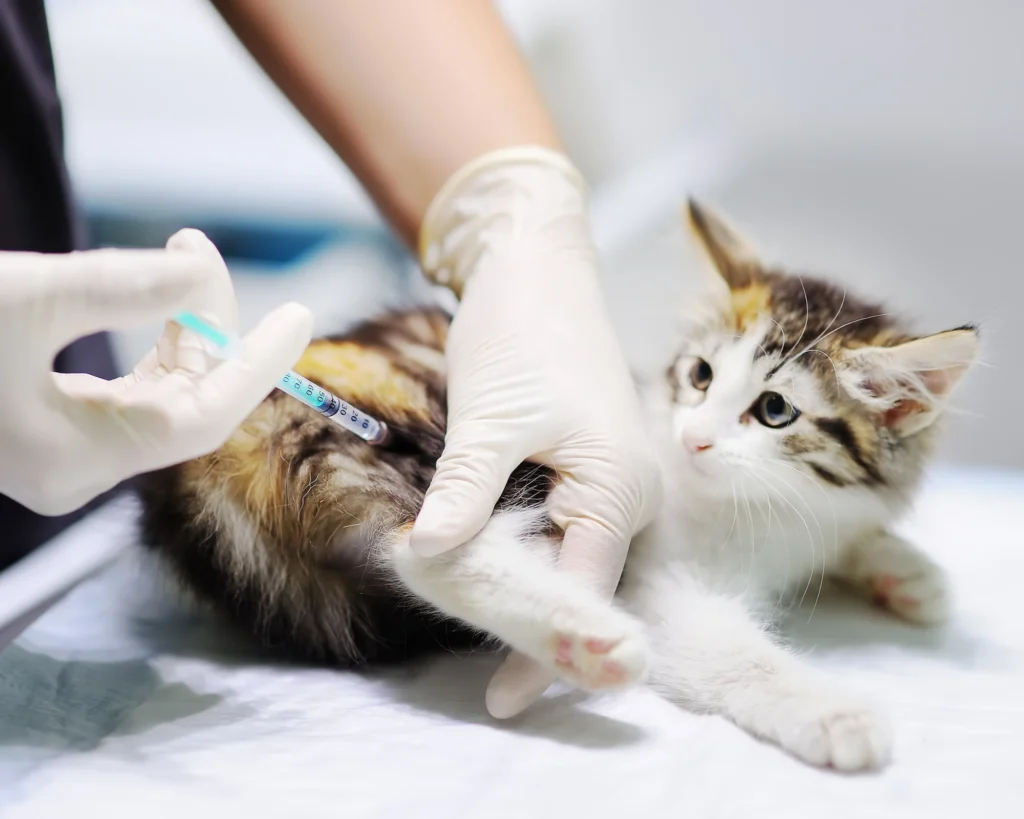Overview
China has become a popular destination among expatriates, many accompanied by family and furry babies. But how difficult is bringing pets to China? To be honest, there are easier destinations, and bringing pets to China, depending on where you’re coming from, may require extensive preparation.
Understanding the unique regulations and requirements of China pet importation plays a major role in preparing your pet adventure. If you don’t have time to read through our full guide, keep in mind the following key points:
- Quarantine Regulations: Pets from non-rabies-free countries may face a mandatory 30-day quarantine.
- Health Certificates: A veterinary health certificate from the exporting country confirming your pet’s good health and vaccinations is required.
- Microchipping: Ensure your pet is microchipped with an ISO-compliant chip for identification.
- Rabies vaccinations: All pets entering China will need to show proof of 2 valid rabies vaccinations.
By paying attention to these factors, you can help ensure a safe and happy transition for both you and your beloved pets as you start your new chapter in China.
Everything you need to know before bringing pets to China

Since 2019, it’s mandatory for imported pets to China to undergo 30 days of quarantine if you are coming from a country that is not designated rabies free by the People’s Republic of China (PRC).
However if you are willing to take extra measures during your travel preparations, you can become eligible to apply for a quarantine waiver.
In a country wide effort to eradicate and control the spread of rabies, the PRC is rather strict on the rules for importing and keeping domestic pets.
In this article we will go over everything you need to know to turn you into a China pet import specialist.
Timeframe
Depending on where you’ll be travelling from with your pet, the timeframe to get ready may vary from approximately 1 to 3 months all-in-all.
The PRC divides countries and territories into two categories; “designated rabies free” or not, and the import requirements are different for the two categories. We will go more into detail about this later.
Quarantine
As mentioned above, since 2019 PRC has imposed a mandatory 30 days quarantine for imported pets from non-designated countries.
However it is possible to request a quarantine waiver. We will discuss this more towards the end of this article.
Dog registration and other regulations to keep in mind
Pet dogs living in China are required to be registered and owners have to obtain a dog license. The timeframe and process may vary depending on which city and province you live in so double check this with the authorities where you (plan to) live.
If you are planning to move to Beijing, the International Center for Veterinary Services (ICVS) offers a comprehensive guide on the dog licensing process in English.
In both Beijing and Shanghai policy restricts every family to one dog at a maximum. The policies slightly vary between the cities in terms of size and breeds. Make sure you check carefully what the rules are for your area before you start your pet travel journey.
In addition, live animals brought into China are limited to one dog or one cat for each person per entry.
Introduction to China: Is residing in China with your pet worth it?

Aside from being one of the largest countries in the world, China bears a rich history and diverse landscapes.
In recent decades, the country’s economy has been soaring, making it a popular destination for investment firms, tech startups, international corporations and of course, the arrival of expatriates and travellers alike.
For pawrents considering moving to China, we recommend that they familiarise themselves with the lifestyle and possible cultural differences surrounding pet ownership in addition to all things pet travel related.
Below follows a brief introduction to China from a pet owner perspective. Read on if you’re interested to get an insight to what to expect once on site with your furry friend.
Cultural nuances
In China, the number of pet owners is on the rise. Owning a pet is getting increasingly popular especially among young people and those who live in urban areas. And they love to post about their fur balls! Just check out Tiktok for example, it’s bursting with funny, pet-related content originating from China.
As a result, more and more amenities and facilities in cities like Shanghai and Beijing are made accessible and enjoyable for pawrents and their pets, such as pet cafes and grooming salons.
However, beware that the attitude toward pets may shift when going into the more rural areas. Pets are often treated as family members in urban settings, whereas in the countryside, they are more often labelled as property or working animals.
Respecting and understanding the cultural differences is important for navigating everyday life as a pet owner in a country with deep-rooted traditions like China.
Regulatory landscape
China imposes rather strict regulations regarding pet importation, with a mandatory 30-days quarantine period for pets arriving from non designated rabies free countries.
Additionally, regulations regarding pet importation and ownership may vary between different municipalities, so make sure to verify what applies for your new home and prepare accordingly. As always, we can’t stress enough the importance of careful preparations to avoid unnecessary delays or complications.
Read on to find more information specific to pet importation to China.
Veterinary services

Since China is a big country, your experience with veterinary care can vary widely.
If you plan to live in any of the major cities, you generally won’t have problems accessing well-equipped veterinary clinics with English-speaking staff. However, rural areas may lack resources for professional pet care services.
Researching local veterinary services ahead of time, including availability of emergency care, vaccination clinics, and specialised treatments, is highly advisable. Keep in mind that Google is not popular in China; Bing and Baidu are what people use instead.
Another helpful tip is to join expat and pet owners groups on Weibo (an alternative to Facebook in China), where you ask others for tips and recommendations for trusted veterinarians.
Pet-friendly spaces
We are seeing an increase in pet-friendly spaces in urban areas, including pet parks, cafes, and other outdoor spaces. As a new expatriate pet owner in town those are great places to socialise, share common interests, and make new friends for both yourself and your fur ball.
But be aware, according to The World of Chinese, there are still a lot of hesitance towards bringing dogs in public areas, and you may be faced with limitations related to size, breed, or even times of the day for taking your doggo out.
We recommend you to explore local areas nearby your new residence to discover which locations permit animals, as well as learn about the leash laws or regulations before visiting.
Housing
One of the common difficulties that pet owners face when bringing pets to China is to find accommodation that welcomes pets. This becomes even more challenging when you plan to settle in one of the big cities with saturated rental markets.
Many landlords have strict no-pet policies, while others may ask for additional deposits or fees from pet owners, narrowing your options down to a minimum. And in addition, apartments in China are small, so finding one that is spacious enough to accommodate you and your pet may take even more time.
Conducting a thorough research to find pet-friendly rentals can help big time. If you need a place to start, Culture Yard wrote an extensive guide about house hunting in China, check out their full article here.
Bringing pets to China: What is the general eligibility?
Depending on the port of departure, and the clinical preparations that your pet has undergone before travelling to China, it may, or may not be subject to quarantine upon arrival.
Pets that require isolation and quarantine shall enter from a port with isolation and quarantine facilities.
All pets entering the PRC will be verified together with their documentation by the customs upon arrival. Based on the verification and check the pet may be put into quarantine, returned or disposed of.
Below follow the general rules regarding bringing pets to China.
Age limit
There is no strict age limit for bringing a pet into the PRC. However, indirectly through the age limits imposed for the rabies vaccinations, and depending on which country you plan to travel from, your pet should be at least 20 weeks old.
Microchip
A EU ISO 11784/11785 microchip is a mandatory requirement for pets coming to the PRC. This is the only approved form of identification, and record of the microchip insertion date should be provided.
The microchip must be implanted on the same day as, or before any mandatory rabies vaccinations and blood tests.
Rabies vaccinations
All pets entering China must show records of TWO rabies vaccinations, with inoculations at least 30 days apart.
If you are coming from a non designated country and want to apply for a quarantine waiver, the most recent rabies vaccination must be within the validity period for import. It can be given before, or on the same day as the blood draw for the rabies antibody titre test.
Read more about the rabies antibody titre test (RNATT) requirements for bringing pets to China below.
Please note that China does not recognize the 2- or 3-year rabies vaccinations from other countries.
RNATT
Although not mandatory for all pets, we still include it in the list of general eligibility for cats and dogs to enter China since it applies to a majority of countries and geographic areas.
For pets entering China from a non designated country, and with the plan to request a quarantine waiver, a valid Rabies Neutralizing Antibody Titer Test (RNATT) result is required.
The rabies serology titer test has to be performed by a GACC-designated laboratory and the result should be ≥0.5 IU/mL for it to be considered passing or adequate.
The blood for the titer test should be drawn at the earliest 30 days after a dog has had its last rabies vaccination.
To check whether your pet will need an RNATT result or not, check our list of designated countries and areas towards the bottom of this article. If your country doesn’t appear in the list we highly recommend you to prepare your pet to travel to China with a valid RNATT result to avoid quarantine.
Other vaccinations and treatments

In addition to the rabies vaccinations and blood test, dogs entering China should also be vaccinated against Canine distemper, parvovirus and Coronavirus. And cats against feline distemper, peritonitis and feline leucopenia.
It’s also highly recommended to vaccinate dogs against kennel cough at least 2 weeks before travelling.
And although there’s no mandatory requirement, we always recommend getting your pets treated for internal and external parasites prior to your departure.
Bringing pets to China: Learn more about additional requirements
Quarantine and quarantine waiver
Since 2019, there’s a mandatory quarantine period of 30 days for cats and dogs entering China from non-designated rabies free countries (not listed below).
There are currently quarantine facilities available in Beijing and Shanghai only. Other cities who do not have quarantine facilities are not considered approved ports of entry for cats and dogs requiring quarantine kenneling.
If you plan to bring a cat or a dog from a non-designated country, you may apply for a quarantine waiver, and if your pet is eligible for the quarantine waiver, you may enter China through other ports of entry then Beijing and Shanghai.
In order for a pet to qualify for quarantine waiver they must meet the following requirements:
- ISO microchip
- 1st rabies vaccination given on the same day as microchip implantation or later
- 2nd rabies vaccination given at least 30 days after the 1st rabies vaccination and valid at the date of importation to China
China does not recognize the 2- or 3-year rabies vaccinations from other countries.
- A passing RNATT result of ≥0.5 IU/mL from a GACC-designated laboratory. Blood draw should be done on the same day as the 2nd rabies vaccination or later
- Canine distemper, parvovirus and Coronavirus vaccinations for dogs
- Feline distemper, peritonitis and feline leucopenia vaccinations for cats
- Import of domestic pets is limited to 1 pet per time and per person
- The owner has to enter China maximum 180 days before the pet importation, or at the latest on the same day as the pet arrives in China.
- Export Health Certificate issued by the Government Veterinary Department of the exporting country.
List of designated rabies free countries and areas
- New Zealand
- Australia
- Fiji
- French Polynesia
- Hawaii
- Guam
- Jamaica
- Iceland
- The United Kingdom
- Ireland
- Liechtenstein
- Cyprus
- Portugal
- Sweden
- Switzerland
- Japan
- Singapore
- Hong Kong
- Macao
If the country you are currently residing in, and plan to travel to China from, is not in this list, it means you will need to follow the guidelines for non designated countries.
Make sure to start out the process and get in touch with a professional veterinarian and/or a pet relocation specialist in time to prepare your pet to travel to China.
Bringing pets to China: How do Purrfect Pilots work and how can we help you

As an experienced pet moving agent specialising in international relocation, we are familiar with the full process of bringing pets to China. Our job is to ensure that your pet has the most comfortable transition possible during their journey and to give you regular updates about your pet throughout the move.
To take off some of the financial burden of moving with your pet to China, we can offer tailored payment plans. Ask your Purrfect Pilot about available options.
During our years of operations, we have built a wide network of professional pet care professionals with the same commitment and passion as we have.
Your pet will only be handled by carefully selected partners where our team can not be present. Our partners are professionally trained in handling live animals according to the IATA live animal regulations and meet Purrfect Pilots’ strict partner requirements.
We offer full transparency from pricing to execution of your pet move and we are great at planning perfect moves.
But to be honest, our biggest strength lies in our industry knowledge and ability to “fix things” when needed. Because moving a pet can become quite the adventure and we always work with a B and a C backup plan to get your pet to destination.
Few pet moves are one-size-fits-all, at Purrfect Pilots we want to listen to your expectations and preferences, and support you in the way you need and want us to.
Purrfect Pilots is a dependable pet mover that helps relocate and travel pets to many countries, including those countries with strict import regulations like the United States of America, Australia, and United Kingdom. Are you looking to move your pet to China? We can help you reunite with your pet.





